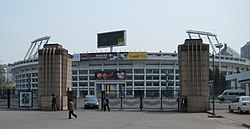Workers Stadium
| 工体 | |
 |
|
| Location | Chaoyang District, Beijing |
|---|---|
| Owner | Beijing Municipal Bureau of Sports |
| Operator |
Beijing Workers Sports Services Centre |
| Capacity | 66,161 |
| Surface | Grass |
| Opened | 1959 |
| Tenants | |
|
Beijing Guoan China national football team 1990 Asian Games 2001 Summer Universiade 2008 Summer Olympics |
|
| Workers' Stadium | |||||||||||||
| Simplified Chinese | 工人体育场 | ||||||||||||
|---|---|---|---|---|---|---|---|---|---|---|---|---|---|
| Traditional Chinese | 工人體育場 | ||||||||||||
|
|||||||||||||
| Transcriptions | |
|---|---|
| Standard Mandarin | |
| Hanyu Pinyin | Gōngrén Tǐyùchǎng |
| Wade–Giles | Kūngrén T'ǐyǜch'ǎng |
| Yale Romanization | Gūngrén Tǐyùchǎng |
| IPA | [kʊ́ŋɻə̌n tʰìŷʈʂʰàŋ] |
Beijing Workers Sports Services Centre
The Workers' Stadium (simplified Chinese: ; traditional Chinese: ; pinyin: Gōngrén Tǐyùcháng), often called Gongti or Gong Ti, is a multi-purpose stadium in the Chaoyang District of north-eastern Beijing, China. It is mostly used for football (soccer) matches. The stadium was built in 1959 and was last renovated in 2004 (the concrete structure was strengthened, a new rotating display screen and energy-saving devices were installed). It has a capacity of 66,161 and covers a land area of 350,000 square meters. It is one of the Ten Great Buildings constructed in 1959 for the 10th anniversary of the People's Republic of China.
The stadium was the main venue for the 1990 Asian Games, where the opening and closing ceremonies were held. Some high attendance matches of the Beijing Guo'an football club are held at the stadium. In 1993 the stadium was host to a slew of World Records set by the world-leading group of Chinese distance runners at the 7th Edition of the Chinese National Games, the most famous being international stars and world champions Wang Junxia and Qu Yunxia, who had dominated the 1993 World Championships a month before.
The stadium holds claim to the fastest women's 1500 m time ever recorded of 3:50.46, the fastest women's 3000 m of 8:06.11 and the fastest women's 10,000 m of 29:31.78. These world records still stand today and are arguably the stadium's biggest claim to fame. The next year, the stadium was partially demolished and renovated as part of China's bid for the 2000 Olympic Games - a bid which ultimately failed. The stadium continued to be a mainstay of Beijing sport into the 21st century, being the Grand Final venue of 2004 AFC Asian Cup.
...
Wikipedia
